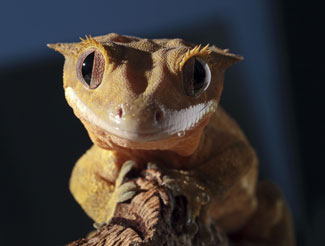2015 Salmonella Outbreak Linked to Contact with Pet Crested Geckos – Advice to Pet Owners
Multistate Outbreak of Human Salmonella Muenchen Infections Linked to Contact with Pet Crested Geckos (Final Update)
This investigation is over. However, reptiles continue to be a cause of human Salmonella infections in the United States. More information about Salmonella from reptiles and how you can reduce your risk of infection is available in English and en Español.

Crested geckos are popular pet lizards that come in a variety of colors.
Contact with reptiles can be a source of human Salmonella infections. Reptiles can be carrying Salmonella bacteria but appear healthy and clean and show no signs of illness.
This outbreak is a reminder to follow simple steps to enjoy your pet and keep your family healthy. CDC does not recommend that pet owners get rid of their geckos. However, if pet owners decide to do so, they should contact a local reputable pet store or reptile rescue for a safe way to relinquish their pet. Do not let a pet gecko loose into the environment.
Always wash your hands thoroughly after handling reptiles and anything in the area where they live or roam, such as their habitats, food, or equipment.
- Adults should supervise young children when washing hands.
Reptiles are not recommended for children younger than five. This includes in home or school settings.
- Children younger than 5 years, people with weakened immune systems, and adults older than 65 years should not handle or touch reptiles or their environment because they are at a higher risk for serious illness and hospitalization from Salmonella germs.
Keep your reptiles and their equipment out of your kitchen or anywhere in your home where food is prepared, served, or consumed.
- Never use food-preparation areas to clean reptile habitats or anything in their habitats. These items should be cleaned outside of your home.
- If you clean the habitat in the bathroom, thoroughly clean and disinfect the area as soon as you finish.
Don’t cross-contaminate! You don’t have to touch a reptile or amphibian to get sick from their germs.
- Be aware that any reptile food, such as frozen or live rodents; equipment; and materials, including tank water, can be contaminated with Salmonella and other germs.
Don’t kiss or snuggle with reptiles and amphibians because this can increase your risk of getting sick.
Persons who think they might have become ill from contact with reptiles should talk to a health care provider.
More information is available in English and en Español.